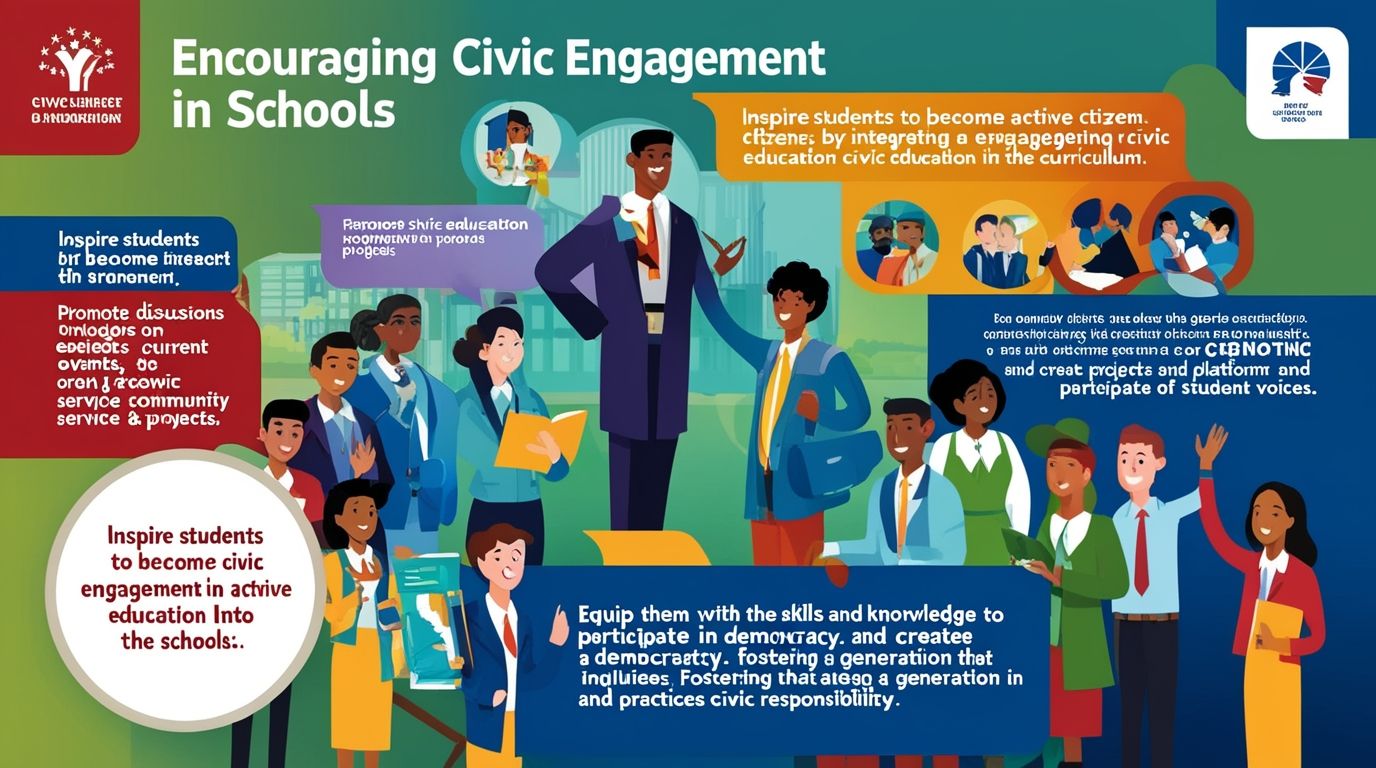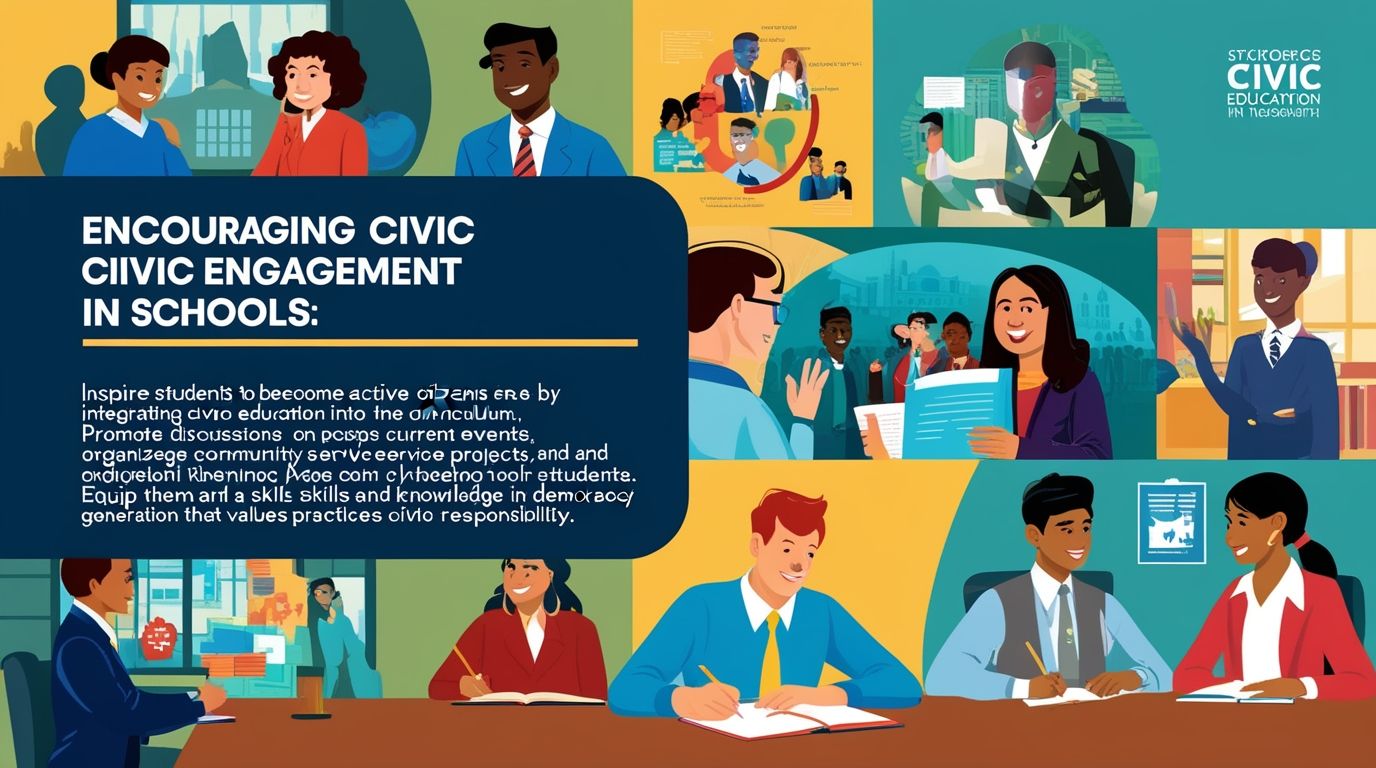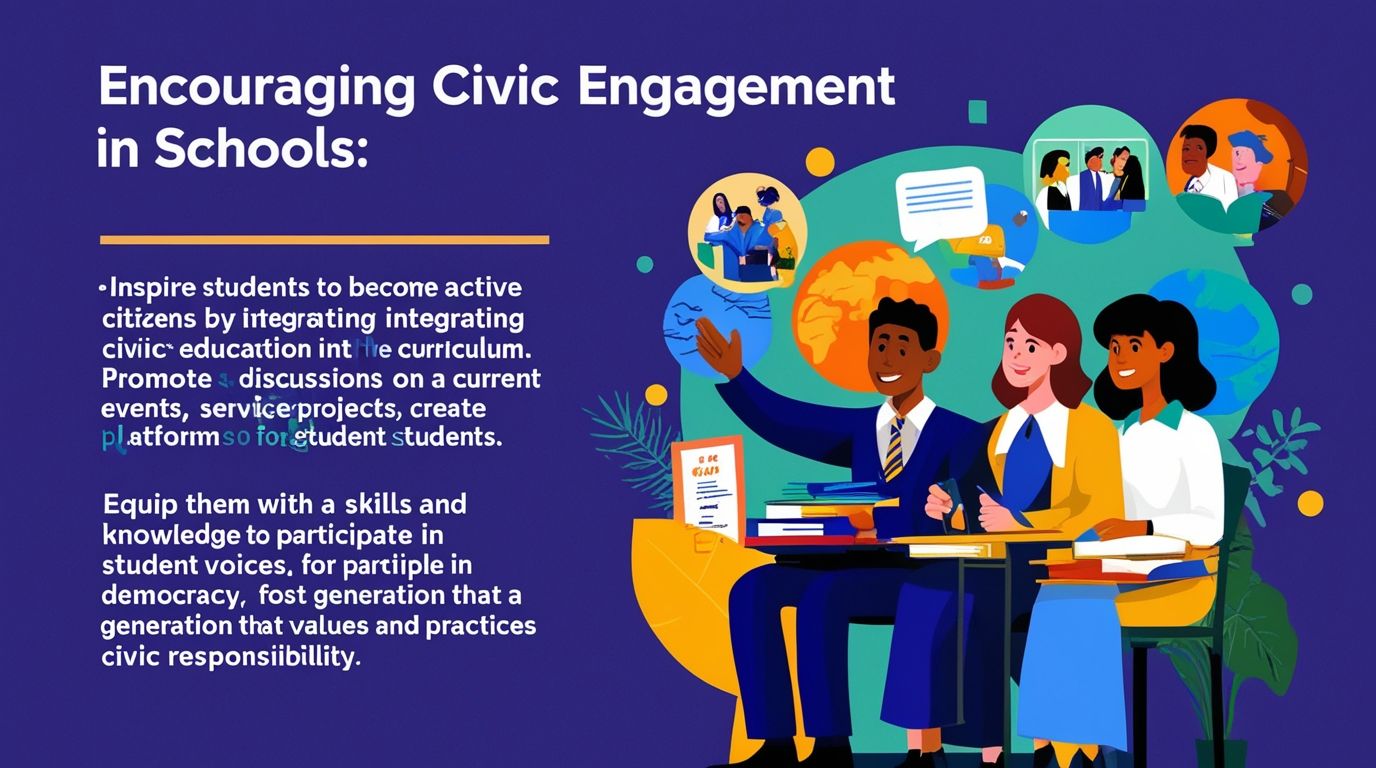Introduction
Encouraging Civic Engagement in Schools Civic engagement is an essential component of a healthy, functioning democracy. It involves individuals participating in activities that contribute to the well-being of their community and society, such as voting, volunteering, and advocating for social causes. Schools play a critical role in fostering civic engagement among students, helping them develop the knowledge, skills, and values necessary to become active and responsible citizens. This article explores the importance of civic engagement in education, the benefits it offers to students and society, and strategies for encouraging civic engagement in schools.
The Importance of Civic Engagement in Education
Civic engagement is foundational to the development of informed, active citizens who contribute positively to their communities. By integrating civic education into the school curriculum, educators can help students understand their rights and responsibilities as citizens, develop critical thinking skills, and foster a sense of social responsibility. Schools are uniquely positioned to cultivate these attributes, as they provide a structured environment where students can explore complex social issues, engage in meaningful discussions, and participate in activities that promote civic participation.

1. Developing Informed and Active Citizens
One of the primary goals of education is to prepare students to participate in civic life. This includes understanding how government functions, the importance of voting, and the role of citizens in shaping public policy. By teaching students about the structures and processes of government, as well as the history of democratic movements, schools can help them become informed citizens who are capable of making reasoned decisions about public issues.
Civic education also emphasizes the importance of active participation in the democratic process. This can include activities such as voting in elections, engaging in community service, and advocating for social change. By encouraging students to get involved in these activities, schools can help them develop a sense of agency and responsibility, empowering them to make a difference in their communities.
2. Promoting Critical Thinking and Media Literacy
In today’s information-rich society, critical thinking and media literacy are essential skills for civic engagement. Students need to be able to evaluate the credibility of information, understand different perspectives, and make informed decisions about social and political issues. Civic education provides opportunities for students to develop these skills by analyzing current events, discussing controversial topics, and engaging in debates.
For example, a classroom discussion on climate change might involve students researching different viewpoints, evaluating the evidence, and presenting their arguments. Through this process, students learn to think critically about complex issues, recognize bias, and consider the implications of different policy decisions. These skills are not only important for civic engagement but are also valuable for lifelong learning and personal development.
3. Fostering a Sense of Social Responsibility
Civic engagement education encourages students to consider the impact of their actions on others and to develop a sense of social responsibility. This involves understanding the needs and challenges faced by different communities, as well as recognizing the importance of contributing to the common good. By engaging in service-learning projects, volunteering, and community-based initiatives, students can gain firsthand experience in addressing social issues and helping others.
For instance, students might participate in a service-learning project focused on homelessness, where they volunteer at a local shelter, conduct research on the causes of homelessness, and advocate for policies that support affordable housing. Through these experiences, students learn about the root causes of social problems and develop a commitment to social justice and community service.
4. Strengthening School-Community Relationships
Encouraging civic engagement in schools also helps strengthen the relationship between schools and the broader community. When students are involved in community projects and civic activities, they build connections with local organizations, businesses, and residents. These partnerships can provide valuable resources and support for schools, as well as create opportunities for students to apply their learning in real-world contexts.
For example, a school might partner with a local environmental organization to create a community garden. Students could help design and maintain the garden, learn about sustainable agriculture, and work with community members to promote healthy eating. This type of collaboration not only enhances students’ learning but also fosters a sense of community and shared responsibility.
Strategies for Encouraging Civic Engagement in Schools
To effectively encourage civic engagement in schools, educators can implement a variety of strategies that integrate civic education into the curriculum, promote student involvement in community activities, and create a school culture that values civic participation.

1. Integrating Civic Education into the Curriculum
One of the most effective ways to encourage civic engagement is to integrate civic education into the school curriculum. This can be done through dedicated civics courses, as well as by incorporating civic themes into subjects such as history, social studies, and language arts. By teaching students about government, human rights, and social issues, educators can help them develop a strong foundation in civic knowledge.
In addition to traditional classroom instruction, educators can use project-based learning to engage students in civic activities. For example, students might work on a project that involves researching a local issue, developing a policy proposal, and presenting their findings to community leaders. This type of hands-on learning helps students understand the relevance of civic engagement and develop the skills needed to participate in public life.
2. Encouraging Student Participation in Civic Activities
Schools can also encourage civic engagement by providing students with opportunities to participate in civic activities both inside and outside of school. This can include organizing school-wide events, such as voter registration drives, mock elections, and debates on current issues. These activities help students learn about the democratic process and practice their civic skills in a supportive environment.
In addition to school-based activities, educators can encourage students to get involved in community service and volunteer work. Schools can partner with local organizations to offer service-learning opportunities that align with students’ interests and academic goals. For example, a school might collaborate with a local food bank to organize a food drive, with students taking on leadership roles in planning and executing the event. These experiences help students see the impact of their efforts and develop a lifelong commitment to civic participation.
3. Creating a School Culture that Values Civic Engagement
To effectively promote civic engagement, it is important to create a school culture that values and prioritizes civic participation. This involves fostering an environment where students feel empowered to express their opinions, take action on issues they care about, and contribute to the school community. Educators can model civic engagement by actively participating in community events, advocating for social causes, and encouraging students to do the same.
Schools can also recognize and celebrate students’ civic achievements, such as through awards, assemblies, or public recognition. By acknowledging students’ contributions to their community, schools can reinforce the importance of civic engagement and inspire others to get involved.
4. Involving Parents and the Community
Engaging parents and the broader community is another important strategy for promoting civic engagement in schools. Schools can involve parents in civic education by organizing workshops, discussion groups, and volunteer opportunities that focus on civic topics. By working together, schools and parents can reinforce the importance of civic participation and provide students with additional support and encouragement.
Community partnerships can also enhance civic education by providing students with access to resources, expertise, and real-world experiences. For example, schools can collaborate with local government agencies, non-profits, and businesses to offer internships, mentorship programs, and community service opportunities. These partnerships help students develop a deeper understanding of civic issues and build connections with community members who can serve as role models and mentors.
5. Leveraging Technology for Civic Engagement
In today’s digital age, technology offers new opportunities for promoting civic engagement among students. Schools can leverage technology to connect students with civic resources, facilitate online discussions, and encourage participation in digital activism. For example, educators can use social media platforms to raise awareness about social issues, organize virtual town halls, and engage students in online campaigns.
Additionally, schools can incorporate digital tools into the classroom to enhance civic learning. For instance, students might use online platforms to research and track legislation, participate in virtual simulations of government processes, or collaborate with peers on civic projects. By integrating technology into civic education, schools can help students develop the digital literacy skills needed to engage in modern civic life.
Conclusion
Encouraging civic engagement in schools is essential for preparing students to be active, informed, and responsible citizens. By integrating civic education into the curriculum, promoting student involvement in civic activities, and creating a school culture that values civic participation, educators can help students develop the knowledge, skills, and values necessary to contribute positively to their communities and society. Involving parents, the community, and leveraging technology further strengthens these efforts, ensuring that students are well-equipped to navigate the complexities of civic life and make a meaningful impact on the world around them. As schools continue to prioritize civic engagement, they play a vital role in shaping the future of democracy and building a more just and equitable society.

jvuj9m
g5m75j
I’ll immediately snatch your rss as I can’t to find your email subscription hyperlink or e-newsletter service. Do you’ve any? Kindly permit me recognize in order that I could subscribe. Thanks.
Unlock exciting rewards with the latest 1xBet promo code! Whether you’re from Bangladesh, Pakistan, India, Nepal, Sri Lanka, Egypt, or the Philippines, you can claim amazing bonuses like free bets, free spins, and welcome bonuses with our updated 1xBet promo codes today. Use your 1xBet promo code for registration to start betting without a deposit or boost your first deposit with extra cash. Enjoy special offers with the 1xBet official promo code, perfect for app users and desktop players. Get your 1xBet free promo code today and experience top-tier betting promotions before they expire! No matter where you are, finding the right 1xBet promo code today means unlocking bigger chances to win, with offers perfectly tailored for players across Bangladesh, Pakistan, India, Nepal, Sri Lanka, Nigeria, Egypt, and the Philippines.
Rediscover your CD collection with this top-rated clock radio and CD player combo. Ideal for bedrooms, offices, or kitchens, it plays your favorite CDs while also offering a reliable alarm clock radio function. Dual alarms let you set separate wake-up times, and the clear digital display is easy to read day or night. With its stereo radio alarm clock capabilities and optional remote control, this CD alarm clock radio ensures comfort, convenience, and crisp audio in one stylish package. A top choice for those wanting the best CD alarm clock for sound and function.
You are my intake, I have few blogs and rarely run out from to brand.
I’m curious to find out what blog system you have been using? I’m experiencing some small security problems with my latest blog and I’d like to find something more risk-free. Do you have any suggestions?
You have noted very interesting details! ps decent website . “What a grand thing, to be loved What a grander thing still, to love” by Victor Hugo.
I’d have to examine with you here. Which is not one thing I usually do! I take pleasure in reading a post that may make folks think. Additionally, thanks for permitting me to comment!
Excellent blog here! Also your site loads up very fast! What host are you using? Can I get your affiliate link to your host? I wish my site loaded up as quickly as yours lol
Good day! I simply wish to give an enormous thumbs up for the good information you’ve got right here on this post. I will probably be coming again to your blog for more soon.
The next time I read a blog, I hope that it doesnt disappoint me as much as this one. I mean, I know it was my choice to read, but I actually thought youd have something interesting to say. All I hear is a bunch of whining about something that you could fix if you werent too busy looking for attention.
Hi, Neat post. There is a problem with your website in internet explorer, would check this… IE still is the market leader and a big portion of people will miss your wonderful writing because of this problem.
Merely wanna comment on few general things, The website design is perfect, the written content is very good. “To the artist there is never anything ugly in nature.” by Franois Auguste Ren Rodin.
Good post. I be taught one thing more challenging on different blogs everyday. It would always be stimulating to learn content from other writers and apply a little one thing from their store. I’d choose to make use of some with the content material on my blog whether or not you don’t mind. Natually I’ll give you a link on your net blog. Thanks for sharing.
Wonderful blog! I found it while surfing around on Yahoo News. Do you have any tips on how to get listed in Yahoo News? I’ve been trying for a while but I never seem to get there! Cheers
When I initially commented I clicked the -Notify me when new feedback are added- checkbox and now each time a comment is added I get four emails with the same comment. Is there any approach you may take away me from that service? Thanks!
Hello my friend! I want to say that this post is awesome, nice written and include almost all vital infos. I would like to see more posts like this.
You have mentioned very interesting details! ps nice web site. “Sutton lost 13 games in a row without winning a ballgame.” by Ralph Kiner.
Exactly what I was searching for, appreciate it for putting up.
F*ckin¦ awesome things here. I¦m very satisfied to peer your post. Thanks a lot and i am looking forward to contact you. Will you please drop me a e-mail?
Greetings! I know this is somewhat off topic but I was wondering if you knew where I could locate a captcha plugin for my comment form? I’m using the same blog platform as yours and I’m having difficulty finding one? Thanks a lot!
I’m impressed, I need to say. Really not often do I encounter a weblog that’s both educative and entertaining, and let me let you know, you will have hit the nail on the head. Your idea is outstanding; the difficulty is one thing that not sufficient people are speaking intelligently about. I’m very completely satisfied that I stumbled throughout this in my seek for something referring to this.